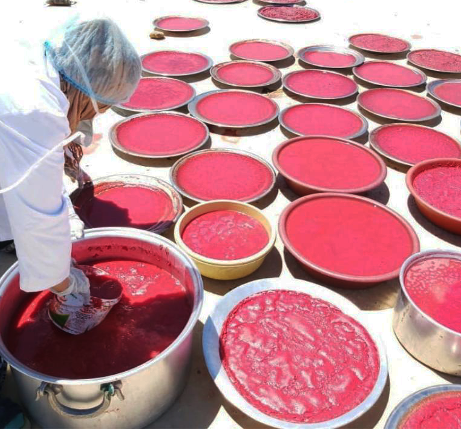Speeches Shim

Syrian women find a ready market for jams, pickles, and tomato paste.
Following a decade of conflict, many potential food processors in Syria find themselves without needed connections to quality vegetables at affordable prices, processing facilities, markets for their goods, and to each other. This influences not only their potential for income, but also the food security of their families.
These critical links are exactly what their local Siraj Centers – supported by USAID’s Advancing Agricultural Markets in Syria (AAMS) program -- provide. Siraj Centers are community livelihoods hubs, established in conflicted-affected areas of Syria under the AAMS program, implemented by the Near East Foundation to provide technical and financial support to food processors and their businesses.
Like all participants, Reem* and Miriam*, attended training and gained access to a processing facility at the Siraj Center where they could produce professional food products. They were also connected directly to a farmer, with whom they arranged the purchase of okra and tomatoes to process and preserve.
“With this process we have shortened the trouble of going to the vegetable market and we have chosen vegetables with the quantities and size that suit us, at competitive prices,” said Miriam.
Najem* found an alternative solution to the challenge of accessing raw materials, which can vary in the markets. With the help of her local Siraj Center, she invested in both vegetable production and food processing. A grant from the AAMS project allowed her to grow all the plants she needs for food processing such as cucumber, lemon, zucchini, and molokhia (a local leafy green). In addition, she was able to purchase a submersible pump which allows her to access groundwater for her crops.
Najem also received all the necessary training, from agriculture technical training to improved processing practices, branding, and marketing for her pickles, jams and dried goods.
Across Raqqa and Hasakah, the women involved in the AAMS project have also been connected to each other. Organized into teams of three to ten women, they can collectively purchase equipment and inputs, share the labor needed to produce marketable products, and attain competitive contracts for their goods.
Together, these women have processed thousands of kilograms of tomatoes into tomato paste, as well as products like pickled cucumbers, pepper molasses, and green molokhia. Through the establishment of their enterprises, the women who participated have generated income for their families, many for the first time.
*All names have been changed to ensure anonymity.

Comment
Make a general inquiry or suggest an improvement.